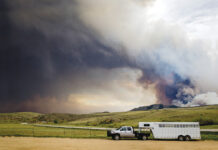While many barn owners post “No Smoking” signs and are diligent about checking for hot bales when storing hay, there are many other steps that horse owners and barn managers should take during the winter to prevent barn fires.

While it’s understandable to want to keep your tack room warm for your barnyard critters, it’s worthwhile to investigate alternatives to the standard heat lamps. For example, some manufacturers sell pet bed that warms by utilizing material that reflects body heat back to your dog or cat.
If you do opt for a heater in your tack room, be sure to make sure that the heaters are working properly and that the cords are in proper working order, recommends Mike Kamphake, a 10-year veteran of the Lexington, Kentucky Fire Department. Heat lamps should never be used with extension cords. All heaters should be turned off when unattended as many do not contain safety devices that prevent overheating or a shut off if they fall over. Additionally, tack rooms should be swept on a regular basis as dust can spontaneously combust.
Sealing windows and doors from drafts can go a long way to keeping tack rooms bearable, as well.
Electric Overload
Wiring and electrical equipment issues are close behind heat lamps as the cause of barn fires. It’s imperative that barn owners check the cords and plugs on every heated water bucket, tank-deicer and other electrical device used. If the cord is worn or frayed, or if the plug is bent, don’t risk it. Have the device properly repaired or buy a new one and save your farm from the potential destruction caused by fire. Wrapping electrical tape around a frayed cord is not a proper repair. Disconnect all appliances when not in use.
Kamphake says that the majority of the barn fires he has been called to have been the result of electrical issues with overloaded circuits.
“Plugging power strips in to other power strips is not a safe alternative to using different outlets,” he advises. “May people don’t understand how much amperage they draw—it’s easy to overload the system.”
Heat It Up
Propane or kerosene heaters can also be an issue. Many barns fire up this equipment while the farrier works on horses. It’s essential that these devices are turned off and stored safely when the shoeing is done. These devices should not be stored near hay or shavings, even when not in use. The kerosene or propane used to fuel them should be stored away from the barn.
It should go without saying that these heaters should never be used in a location where horses might kick or knock them over.
Water, No Ice
Keeping water free from ice is an ongoing battle for many farm owners in the winter. Any heat tapes or water tank heaters that are used in a barn must be installed according to manufacturer’s instructions, have a thermostat and be UL-listed.
Kamphake encourages routine checking of the water heaters to ensure that every part is in working order to avoid a fire. “If any part of any cord looks frayed or worn, it’s worth it to buy a new one,” he recommends.
Read more about winter hydration for horses >>
Deck the Aisles
The holidays can be a fun time for both boarding barns and hobby farms alike, as lights are strung from rafters and wreaths adorn stall doors. Using outdoor-grade lights in the barn is necessary, as cords are exposed to the elements. Extension cords should be heavy-duty and industrial rated.
While it can be tempting to “daisy chain” extension cords, meaning plugging one in to the next to get the desired length, this is not the safest route to take. Buying a longer, outdoor-grade extension cord is safest, as is utilizing only the plugs available, not plugging in a power strip to a power strip so more plugs are handy.
Read more about safe holiday decorating at the barn >>
Keep it Clean
Winter is not a time to become lax about cobweb removal in your barn, even if it’s cold and you’d rather ride and then go inside. Cobwebs provide fire an easy, rapid way to spread; falling pieces of flaming cobwebs falling to the ground can even start new fires.
Cold weather drives lots of critters into the warmth of a barn, especially in hay lofts. In addition to potentially harming your horse if he ingests rodent’s feces, the possibility of them chewing through things they shouldn’t also increases—including wiring. To help prevent the possibility of this, all electrical wires should be encased in metal conduits.
It’s a good idea to run even any temporary wires, like extension cords, through conduit to prevent not only rodent access, but also to eliminate the chance of being grabbed by horse’s teeth or struck by their shoes.
Preventing fires on the farm requires just as much—if not more—diligence in the winter than in the summer. With a watchful eye and careful attention, your horses will stay safe until the spring thaws come.
Liked this article? Here are others you’ll enjoy:
Extinguish the Threat of Barn Fires
Prepare for Winter at the Barn






good tips.
good info
Great advice.
What does fire department recommend for removing cobwebs ( besides brushing them off walls)?